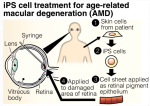Japan conducted world’s first surgery to implant “iPS” stem cells to restore human sight

World’s 1st iPS transplant performed
Date: Sep 12, 2014
Source: Yomiuri Shimbun
KOBE (Jiji Press) — A team led by RIKEN researcher Masayo Takahashi performed a transplant of retina cells on Friday on a woman suffering from an eye disease, in the world’s first clinical study using induced pluripotent stem, or iPS, cells.
The surgery was carried out on a female resident of Hyogo Prefecture in her 70s at the Institute of Biomedical Research and Innovation Hospital in Kobe in the western Japan prefecture.
iPS cell treatment for age-related macular degeneration (AMD)
The surgeons included Yasuo Kurimoto, a doctor at the hospital.
In the study, the team led by Takahashi, a member of the RIKEN Center for Developmental Biology, also in Kobe, will confirm the safety of retina cells produced from iPS cells, which are capable of developing into almost all types of tissue.
The team will spend four years to check whether the transplanted cells take hold, whether the cells turn cancerous, and whether the treatment improves the eyesight of the subject.
The transplant was conducted to treat exudative age-related macular degeneration, which causes abnormal blood vessel formation in the retinas and could lead to total loss of vision.
The subject was chosen because she was suffering from a disease type that is hard to treat with existing drugs or treatment.
In the surgery, a damaged portion of pigment epitheliums, a type of tissue that conveys nutrition to sensory retinas, was replaced with new pigment epithelium cells produced from iPS cells that were created from skin cells of the subject.
Continue reading »









